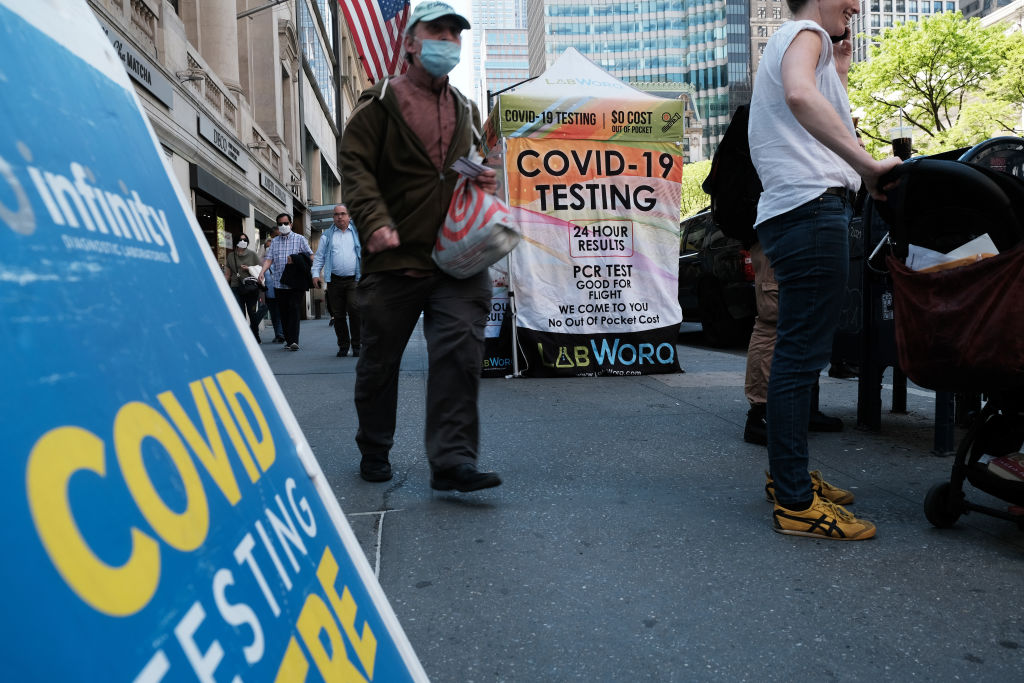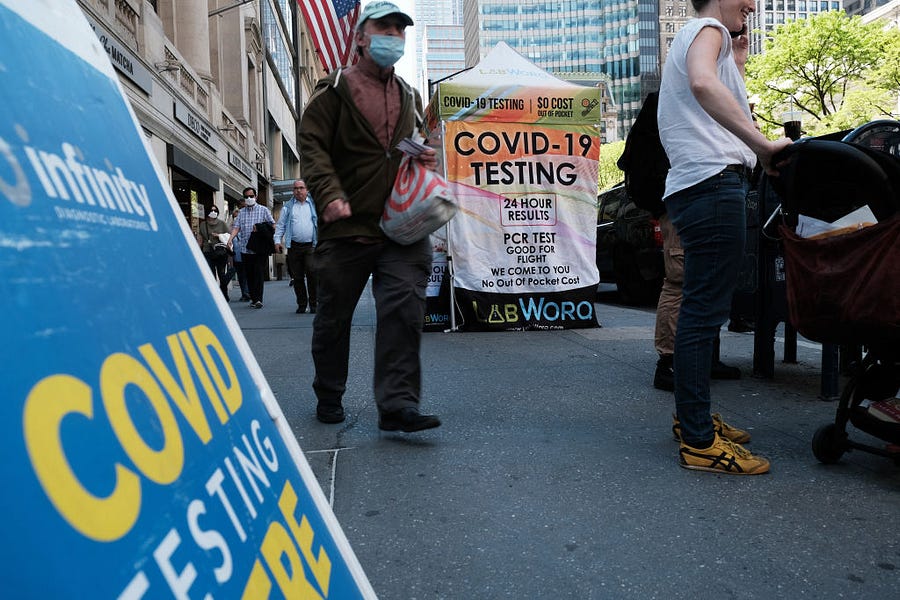Happy Friday! After closing up shop (tent?) in the spring of 2017, the Ringling Brothers circus announced the Greatest Show on Earth will return next September. We’d like to thank politics for filling the void these past five years.
Quick Hits: Today’s Top Stories
-
The Senate voted 86-11 on Thursday to pass a $40 billion Ukrainian aid package, sending the measure to President Joe Biden, who is expected to sign it into law. The legislation—the largest of its kind since Russia’s invasion of Ukraine—will appropriate about $9 billion to replenish the United States’ weapons stockpile, $6 billion to provide security assistance to Ukrainian forces, and $14 billion for various State Department activities—including $9 billion to prop up Ukraine’s economy, $400 million to investigate war crimes, and $300 million to rebuild and secure the American embassy in Kyiv.
-
The U.S. Census Bureau released its standard post-enumeration survey on Thursday, finding eight states (Delaware, Hawaii, Massachusetts, Minnesota, New York, Ohio, Rhode Island, Utah) were statistically overcounted in the 2020 census and six states (Arkansas, Florida, Illinois, Mississippi, Tennessee, Texas) were statistically undercounted. The bureau had previously estimated the 2020 census overcounted white and Asian residents and undercounted black, Hispanic, and Native American residents.
-
One week after the Justice Department said the U.S. Marshals Service would provide additional support to the marshal of the Supreme Court in the wake of the leaked Dobbs opinion, Attorney General Merrick Garland announced all Supreme Court justices will get “around-the-clock security” at their homes. “The Justice Department will not tolerate violence or threats of violence against judges or any other public servants at work, home, or any other location,” Garland said.
-
The Justice Department announced Thursday it was revising its enforcement of the Computer Fraud and Abuse Act to ensure security researchers who hack computer systems in “good faith”—to test, investigate, or correct network flaws or vulnerabilities—are not prosecuted.
-
Sri Lanka defaulted on its debts on Thursday for the first time in its history, with central bank governor Nandalal Weerasinghe announcing the country wouldn’t be able to make payments until the debt is restructured. The government is in talks with the International Monetary Fund for a bailout, and inflation could rise as high as 40 percent in the coming months.
-
Former FBI General Counsel James Baker strengthened Special Counsel John Durham’s case against cybersecurity lawyer Michael Sussmann on Thursday, testifying in the latter’s trial that Sussmann told him he wasn’t acting on behalf of any client when he provided the FBI with information before the 2016 election alleging a link between the Trump Organization and a Russian bank. Durham’s team alleges Sussmann was acting on behalf of the Hillary Clinton campaign at the time, and charged him with lying about his ties. Baker said he would have “made a different assessment” about the information had he known it was linked to the Clinton campaign.
-
Soaring prices combined with rising mortgage rates have continued to cool housing demand, the National Association of Realtors (NAR) said Wednesday. Existing-home sales fell 2.4 percent from March to April—the third straight month of decline—while the median sales price rose 14.8 percent year-over-year to $391,200.Mortgage rates remain elevated as the Federal Reserve signals additional interest rate hikes, with the 30-year fixed rate average sitting between 5 and 5.5 percent this week.
-
The Labor Department reported Thursday that initial jobless claims—a proxy for layoffs—increased by 21,000 week-over-week to 218,000 last week. The measure has risen two of the last three weeks, but remains near historic lows.
-
The Centers for Disease Control on Thursday formally recommended children ages 5 through 11 receive a COVID-19 vaccine booster five months after their first two doses. The agency also encouraged anyone older than 50 (or older than 12 with immunodeficiencies) to get a second booster dose four months after their first.
The Latest on COVID-19—and Monkeypox?

After a glorious six-week hiatus, the White House’s COVID-19 briefings returned this week with a cheery message: 1 in 3 Americans should be back to wearing masks right now. Coincidentally, 1 in 3 Americans in a recent Axios/Ipsos poll believe the pandemic is over.
About a quarter of respondents in that same survey also thought case counts were falling in their state, and—unless the poll dramatically oversampled people from Maine—just about all of them are wrong: Infections are rising in 49 states, and up 52 percent nationwide from two weeks ago. We’re now averaging more than 100,000 confirmed daily cases again for the first time since February, and hospitalizations have jumped nearly 30 percent since early May. Deaths have continued to fall—down 17 percent over the same time period—but they’re a lagging indicator, and will likely reverse at some point in the next few weeks, if previous waves are any indication.
The infection numbers are almost assuredly undercounts, too. Testing has fallen off dramatically as the pandemic has shrunk from public consciousness, and plenty of at-home test results are likely going unreported. The BA.2 subvariant of the Omicron variant still accounts for most of those cases, but the highly transmissible BA.2.12.1—also an Omicron subvariant—is gaining ground. And we recently passed 1 million American deaths attributed to the virus, shattering early models’ predictions of a couple hundred thousand.
It’s against this backdrop that Centers for Disease Control and Prevention officials took the podium Wednesday to fight the losing battle of recommending masks again for the third of Americans—mostly in the Northeast and Midwest—who live in counties with “medium to high” transmission rates. They put Americans elsewhere on notice, too. “Prior increases of infections, in different waves of infection, have demonstrated that this travels across the country,” CDC head Rochelle Walensky said.
Americans—mentally done with the past two years—have responded with one big shrug. Even deep-blue areas—where COVID hawkishness held strong through the end of this winter’s Omicron wave—are struggling to feign concern. “If every variant that comes, we move into shutdown thoughts, we move into panicking, we’re not going to function as a city,” New York City mayor Eric Adams said Wednesday.
Even if it’s not this one, odds are good there’ll be another wave in the fall or winter that we can’t as easily ignore. And recent studies have shown natural immunity from Omicron is weak and limited against even future Omicron infections—it could prove essentially useless against whatever variant the virus cooks up next. That’s why researchers are working on variant-specific boosters for the fall—and the Biden administration is trying to get Congress to allocate some more pandemic pandemic funding.
“As we get to the fall, we are all going to have a lot more vulnerability to a virus that has a lot more immune escape than even it does today and certainly than it did six months ago,” the White House’s new COVID-19 coordinator, Ashish Jha, told the Associated Press last week. “That leaves a lot of us vulnerable.”
And while the current surge is strongest in the Northeast, it could cause more hospitalizations and deaths as it reaches areas where fewer people are vaccinated. “Two-and-a-half years in, we know exactly what’s going to happen,” said Dr. Isaac Bogoch, an associate professor and infectious and tropical disease specialist at the University of Toronto. “If the question is, will there be a rise in cases, hospitalizations, and deaths, the answer is yes. Yes, there will be. This is going to disproportionately impact vulnerable populations, immunocompromised individuals, at risk communities, under-vaccinated communities—as it has with every prior wave.”
“How big is that wave going to get? We’re not too sure,” Dr. Katelyn Jetelina—epidemiologist at the University of Texas School of Public Health—told The Dispatch. “How much wood does BA.2 have left to burn?”
The good news is that, although the virus is ever inventing tricky new mutations, our toolkit for fighting it off is still pretty well-stocked. The existing vaccines are less effective at fending off infection by the new variants than they were earlier strains, and vaccinated people are still much less likely to end up hospitalized or dead from COVID-19. For those who do contract the virus, Omicron still tends to cause milder illness than previous strains, and increasingly accessible antiviral therapies can reduce the risk of catastrophic outcomes even further.
As we’ve said before, we’re really at the choose-your-own-adventure phase of the pandemic: COVID-19 habits are now driven almost entirely by one’s own risk tolerance.
Jetelina recommended relying less on local case counts—since we’re likely undercounting at this point—and focusing instead on trends. “If your area or county is trending up, dial up behaviors, and when it’s trending down or plateauing, then it’s time you can be a little more relaxed,” she said, noting that by this measure residents in two-thirds of the nation’s counties should mask up. Bogoch emphasized “it’s not too late” to get vaccinated. And if you’re looking for more tests, you can now request another batch from the federal government shipped to your house.
“Everyone has to just evaluate their own risk tolerance,” said Dr. Monica Gandhi, infectious disease expert at the University of California San Francisco. “I have an 87-year-old father who just went through chemo, and I am still encouraging him to be around others. … I feel that confident in how well our vaccines [and treatments] work.”
P.S. One infectious disease at a time, please. With almost 100 suspected “monkeypox” cases suddenly cropping up in Europe, Canada, and the U.S., when should we panic???
“Never,” according to Bogoch. “Never. At no point.”
For those who haven’t been obsessively following the monkeypox news: Endemic to parts of Africa, the illness is related to smallpox and is associated with similar—but milder—symptoms. We typically don’t see this many cases at once outside Africa, Bogoch said, so public health officials will try to determine the source—or sources—of the recent international flare up. The smallpox vaccine protects against monkeypox in a limited way, but since the vast majority of people no longer receive smallpox vaccines, there could be more frequent outbreaks in future.
But it’s not the new COVID-19. “It might take some time for this to get under control,” Bogoch said. “But this is not an extremely transmissible, respiratory viral infection. It is a communicable disease, it absolutely is, but it’s not like COVID.”
Worth Your Time
-
An underdiscussed reason for social media’s toxicity, Ryan Streeter argues in Law & Liberty, is the absence of moral sentiments. “Moral sentiments—the affections and inclinations that prompt us to do good—keep our passions from overwhelming us and our minds from misleading us. … They develop through repetition as we emulate and admire good behavior around us,” he writes. “Because it cannot recreate the environment in which humans connect more deeply, social media is a poor vehicle for the cultivation and transmission of moral sentiments. As [Jonathan] Haidt and others have shown, social media is more likely to cultivate the opposite of moral sentiments by creating intense interpersonal engagement without moral connectedness. The addition of tools such as retweet and ‘like’ buttons, Haidt argues, has placed a premium on the outrageous behavior that best drives virality, and conversely, are ill-suited to the kind of interaction required to improve our moral habits. It is as if social media were purposely designed, using findings from the best psychological research, to create a space where the passions and ideological confusion overwhelm moral formation—where head and gut overwhelm the heart.”
-
The “great replacement theory” espoused by the Buffalo shooter is not the same as the one pushed by Tucker Carlson or Rep. Elise Stefanik, Ramesh Ponnuru argues in his latest Bloomberg column. But the latter version is “irresponsible” and “wrong,” too. “The major laws governing immigration policy were passed with large bipartisan majorities in 1965, 1986 and 1990, at a time when neither party saw the issue as a dividing line between them,” he writes. “To the extent that the limits on immigration have not been enforced since these laws were passed, it has had more to do with business opposition than with anyone’s desire to change the country’s political demography. To suggest that Democrats support amnesty and high immigration levels simply because they want a new electorate, or that this desire is the reason for the flaws of today’s immigration system, is to oversimplify to the point of falsity. No plan has been put in place to replace today’s voters, and especially its White working-class conservative voters, and it would be dangerous for the country’s civic health to maintain otherwise even if we had no armed lunatics in our midst.”

Presented Without Comment
Also Presented Without Comment
Toeing the Company Line
-
You’ve probably heard of quantum computing but, uh, what is it exactly? And why is it so important to U.S. national security? Klon has you covered in this week’s edition of The Current. “Classic physics says two things can’t be in the same place at the same time or be completely present in more than one place at a time. Quantum physics, however, says, ‘rules are for losers,’ and allows objects to exist in two distinct states simultaneously,” he writes. “Confused? Good, that means you are getting it.”
-
In this week’s Stirewaltisms (🔒), Chris laments the centrality of market and public opinion research to our politics. “Market research doesn’t do a good job of capturing voters’ ambivalence, nor can it truly test the popularity of concepts not already in circulation, nor can it control for ways in which details and execution shape perceptions,” he notes. “What it can always catch, though, are the loudest, most determined, activist sentiments. Those folks would break the doors down to say what they want.”
-
Tim Alberta of The Atlantic dropped by The Remnant on Thursday for a conversation with Jonah about his latest piece on the Evangelical church. As the son of a pastor who grew up in Michigan, what surprised Alberta about reporting the piece? Why is he “angry”? Plus: Some rank 2024 GOP presidential punditry.
-
On the site today, Stephen Gutowski offers up an explainer on “red flag laws” that allow certain people (law enforcement, teachers, parents) to request that a court prohibit an individual from buying or possessing firearms. Richard Goldberg details why congressional Republicans need to stop giving the cryptocurrency industry a pass. And Anthony Ruggiero previews the agenda for the World Health Organization’s upcoming World Health Assembly, noting that proposed U.S. reforms play into the hands of China.
Let Us Know
If you had to eat the same thing every day for 50 years, what would you pick?







Please note that we at The Dispatch hold ourselves, our work, and our commenters to a higher standard than other places on the internet. We welcome comments that foster genuine debate or discussion—including comments critical of us or our work—but responses that include ad hominem attacks on fellow Dispatch members or are intended to stoke fear and anger may be moderated.
With your membership, you only have the ability to comment on The Morning Dispatch articles. Consider upgrading to join the conversation everywhere.